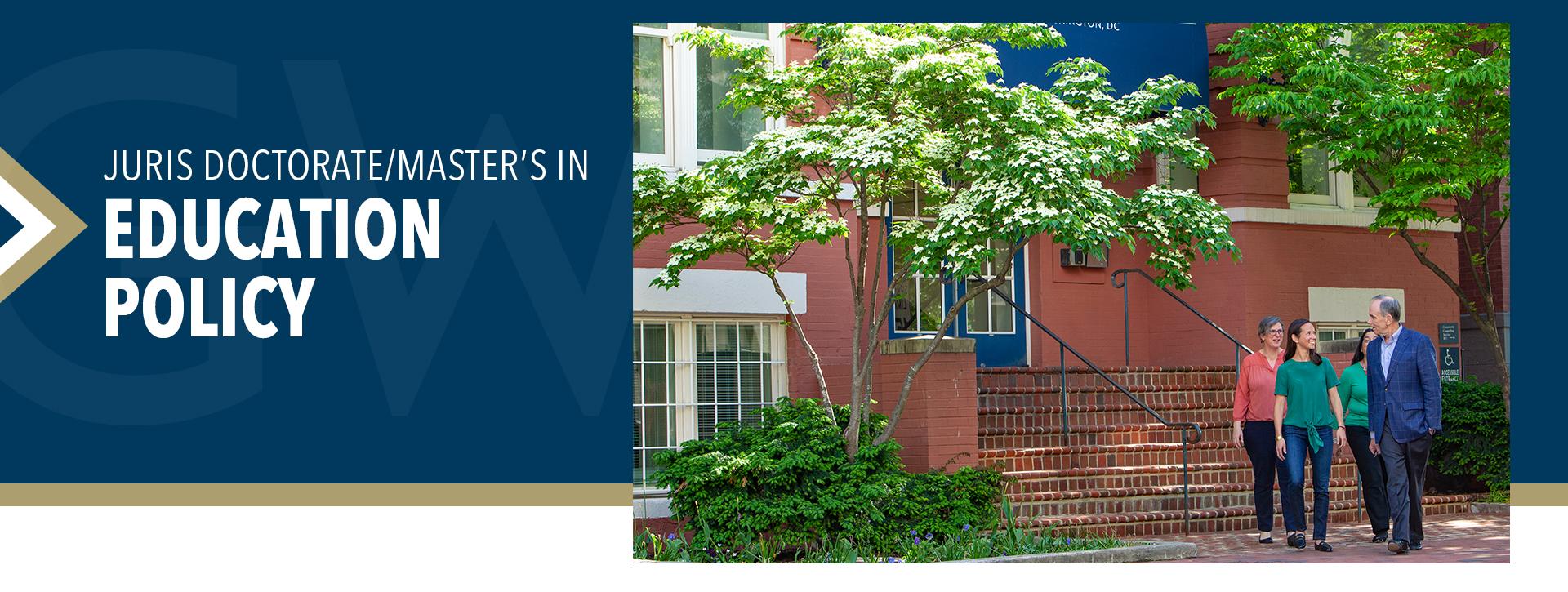Juris Doctorate / Master's in Education Policy
Study Law & Policy Where Law & Policy Is Made
Today's challenges within our education system are diverse but well known, and include closing the achievement gap, increasing access to higher education for marginalized communities, improving the quality of instruction, staffing shortages, and more. Education policy and reform is the key to addressing these issues. Public policy is inherently linked with the legal community, leading law students and education students to seek a cross-disciplinary educational background.
GW’s Graduate School of Education and Human Development (GSEHD) has partnered with GW Law to address the cross-section of education policy and law issues and problems. The two schools offer a joint program leading to the Master of Arts in Education and Human Development (MAEd&HD) degree in Education Policy and a Juris Doctor (JD) degree.
Join us to develop your skills in analyzing the political, social and organizational environments affecting the education landscape employing legal skills. Learn to develop, analyze, implement and evaluate policy options to tackle these key education problems.
Learn more about the role of education policy experts in shaping the future of education >
Small + Diverse
Our students come together from around the world, bringing a range of experience and viewpoints that result in dynamic dialogue. The small class size ensures individualized learning and mentorship from faculty, as well as substantive engagement.
Shorten Time to Dual Degree Completion
Students who enroll full-time in the joint program should normally be able to complete both degrees in four years.
Leading Faculty
Learn from nationally recognized researchers and practitioners with extensive experience leading research and professional organizations in education policy.
Our Location is Your Advantage
Uniquely situated in the heart of Washington, D.C.—with proximity and connections to several think tanks, policy organizations, federal agencies, and professional associations—students are provided unparalleled access to gain experience in the field through internship and career opportunities.
GSEHD provides a wealth of hands-on learning experiences to hone your research skills and abundant, flexible course choices. Benefit by examining education reform in the policymaking capital of the world.
Founded in 1865, GW Law was the first law school in Washington, DC, and it continues to make history, having produced some of the top legal minds of our country. The school is accredited by the American Bar Association and is a charter member of the Association of American Law Schools.
Degree Awarded:
Joint Degree: Juris Doctorate and Master of Arts in Education and Human Development in the Field of Education Policy Studies
Department:
Educational Leadership
Course Delivery:
Foggy Bottom Campus:
GSEHD and GW Law
Program Entry:
Fall
- Our Mission
We aim to provide program graduates with the necessary skills to carefully assess and analytically examine education problems in complex settings that interact with their broader social environments, at the international, national, state, and local levels.
- Curriculum Requirements
- Students must be admitted to both GSEHD and GW Law separately, and each school must approve the student's application to pursue the joint degree.
- During their first year, students are in residence at GW Law, taking exclusively first-year law courses. Thereafter, students take a mix of classes in both the Law School and GSEHD.
- The Law School will allow joint degree students to count a maximum of 12 credit hours completed in a master's program toward the 84 credit hours required for the law degree. GSEHD counts 12 credits in courses taken for the JD toward the MAEd&HD. Learn more about law dual degree credits >
- Graduation Requirements: The degrees of the joint program in JD/MAEd&HD in Education Policy must be conferred simultaneously and only after all requirements for both degrees have been met. Capstone projects, language requirements, and/or any other requirements must be fully met before the law degree will be conferred. Students should confer with an adviser for specific requirements of the joint program.
The following requirements must be fulfilled for the Master's program: 36 credits, including 24 credits in required GSEHD courses and 12 credits in elective Law School courses.
Course List Code Title Required EDUC 6114 Introduction to Quantitative Research or EDUC 6116 Introduction to Educational Statistics EDUC 6314 History of American Education Reform EDUC 6368 Leadership and Education EDUC 6371 Education Policy EDUC 6381 Program Evaluation: Theory and Practice EDUC 6388 Analysis of Education Policy Issues EDUC 8122 Qualitative Research Methods And One of the following: EDUC 6601 International and Comparative Education EDUC 6602 Regional Studies in International Education EDUC 6610 Programs and Policies in International Education EDUC 6650 Education and National Development Elective Courses in Law for GSEHD Students (12 Credits) Below is a sample listing of courses from the law school that may be accepted for joint degree students. Joint degree students must seek prior approval from their GSEHD faculty advisor to ensure that any course taken will be considered toward the MA.Ed. electives. LAW 6395 Constitutional Law and the Supreme Court LAW 6398 The Law of Democracy LAW 6399 Constitutional Law Seminar LAW 6388 Civil Rights Legislation LAW 6230-6249 Courts & Civil Litigation LAW 6230-6249 Courts & Civil Litigation LAW 6330-6354 Property, Family Law & Torts LAW 6360-6379 Criminal Law & Procedure LAW 6380-6399 Constitutional Law & Civil Rights: Law LAW 6400-6426 Administrative Law & Government Regulation: Law LAW 6470-6496 Intellectual Property Law LAW 6500-6512 Government Contract Law LAW 6392 Gender Discrimination and the Law LAW 6596 Law of Race and Slavery LAW 6595 Race, Racism, and American Law LAW 6348 Family Law LAW 6349 Family, Child, and State LAW 6352 Family Law Seminar LAW 6338 Housing Law and Policy Review Descriptions for All Law Courses > Elective Courses in GSEHD for Law Students (12 Credits) GSEHD courses from which joint degree students may choose are listed below. The Law School Dean may approve credit for additional GSEHD courses that are law-related and develop policy analysis skills. Research methods courses or other courses as they become available may also be counted towards meeting the Masters in Education Policy elective requirements. Below is a list of potential elective courses to be taken only after the designated advisor's approval of them. EDUC 8323 Policies of Education Equity EDUC 6100 English Learners and Education Policy Issues EDUC 8320 The Politics of Education EDUC 8321 Economics of Education EDUC 6236 School Law and Policy EDUC 6258 School Finance EDUC 8322 Education Policy Implementation EDUC 8325 Policy Design SPED 8352 Disability and Public Policy CNSL 6397 Law and Rehabilitation Counseling - Program Outcomes
- Students are exposed to multiple analytical perspectives in addressing various contemporary education problems such as urban schooling reform, student achievement, education funding and its equity implications, teacher quality and effectiveness, inequality and equal opportunity, access to higher education, and accountability in educational systems.
- Graduates of the degree program develop skills to:
- Evaluate contemporary education policies and programs, as well as their intended and unintended consequences
- Conduct research in the field of education policy
- Analyze the factors that shape policy decisions, such as political and social environments, and the link between research and policy decisions
- Understand the policy process and the context in which policies mature
- Develop policy options, analyze their potential, and select the most promising
- Implement policies effectively and evaluate their impacts
- Inform better practice
- Advocate on behalf of policies
- Analyze the implementation of policies and assess their impacts
- Understand the technical, political, and managerial aspects of education policy
- Example Research Questions
The following are examples of extensively analyzed education policy problems:
- Do standards-based reforms like NCLB and ESSA reduce or exacerbate the achievement gap in school systems?
- Do charter schools educate students better?
- Should pre-schooling be universally provided and funded by governments?
- Are teachers adequately paid?
- Does reducing class size lead to better student outcomes?
- Do affirmative action policies lead to better access and success in college?
To help them understand the complexities of such questions and seek answers to them, policymakers rely on a cadre of analysts who possess the necessary skills to systematically and carefully provide potential answers to such questions and assess the conditions in which the answers may differ so that decision-makers are best informed while constructing policies that often have lasting impacts. GSEHD's Education Policy program prepares students to develop those skills and to attain positions at various policy organizations.
Apply Now
GSEHD’s Office of Admissions invites you to apply for a spot in our program. Please review the following admission and financial information.
Students must be admitted to both the Law School and, separately, to GSEHD's Master's in Education Policy Studies program. The GW Law and the Education Policy program in GSEHD must separately approve a student's application to pursue a joint degree program. Only students admitted by both programs will be admitted to the joint JD/MAEd&HD degree program in Education Policy.
Students who register first in the Law School must apply to GSEHD by the end of their third semester as JD candidates.
Ready to take the next step in your career? Review our step-by-step guide to applying to GSEHD >
To learn more about the program, admission process, and upcoming events, please connect with the GSEHD Admissions Team at askdel![]() gwu [dot] edu (askdel[at]gwu[dot]edu) or 202-994-9283.
gwu [dot] edu (askdel[at]gwu[dot]edu) or 202-994-9283.
| Apply Now | Schedule Meeting with Admissions Coach |
To be considered for admission to GSEHD's program, applicants must submit the online application form as well as the following required supporting documents. There is no application fee.
- Prerequisite: Bachelor's Degree
- Resume (Educational Attainment, Job Skills, Experiences)
- Statement of Purpose: State your purpose in undertaking graduate study in Education Policy at GW (describe academic objectives, research interests, career plans- in relation to your qualifications, and accomplishments.
- Two Letters of Recommendation: At least two letters of recommendation from an academic instructor/advisor or someone who can speak to your academic capabilities.
- Transcripts from all previously attended colleges or universities
*Additional application requirements may exist for international applicants.
GSEHD is accepting applications for Fall 2026. We encourage you to apply as early as possible.
Application Timeline Fall Priority Deadline Nov 1 Round 1 Deadline Dec 15 Round 2 Deadline Jan 15 Round 3 Deadline March 1 Round 4 Deadline May 1 Round 5 Deadline June 15
For more information or to inquire about the next admissions cycle, contact the GSEHD Admissions Team at askdel gwu [dot] edu (askdel[at]gwu[dot]edu) or 202-994-9283.
gwu [dot] edu (askdel[at]gwu[dot]edu) or 202-994-9283.
Tuition & Financial Aid
We know embarking upon graduate school is a big decision. At GW, we understand the time and thought behind making graduate school work for you. Please take a moment to learn more about the options and opportunities available to help fund your graduate education.
As a rule, law students are eligible for three years of financing through law school funds, or four years if a student is enrolled in the part-time program Check with the Law School Office of Financial Aid for specific guidelines on funding available to joint degree students whose enrollment will exceed the established matriculation periods.
Graduate tuition is charged per credit hour, unless otherwise noted. Rates vary by program and location.
For this dual degree program, Law School tuition rates govern, unless a joint degree student is enrolled exclusively in master's program courses. In such semesters or summer sessions, the graduate tuition rate will apply.
The tuition rate* for the Master's in Education Policy Studies program is $1,960 per credit hour.
Please note: Additional fees may apply for international students, late fees, etc. Current tuition rates may be updated during the year.
*Summer 2025, Fall 2025 and Spring 2026
Scholarships are available to eligible admitted students. Review eligibility requirements and learn more about funding your education >
Career Outlook
By earning a JD and Master's, you gain the flexibility in assuming positions that intersect law and education policy at a variety of organizations that cater to both. Graduates assume positions at think tanks, non-profit national organizations, government agencies, and international organizations providing support analysis for education-related decision-making.
- Potential Employment Settings
-
Alumni of the program have held positions at key policy organizations such as:
- Congressional Research Services
- the American Institutes for Research
- Children's Defense Fund
- Annie E. Casey Foundation
- National Governors Association








